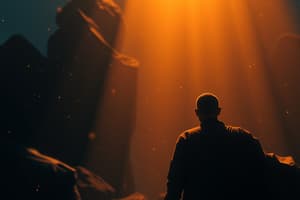Podcast
Questions and Answers
What is the primary purpose of using long shots in cinematography?
What is the primary purpose of using long shots in cinematography?
- To convey the subjective experience of characters
- To create depth and movement within the frame
- To establish locations and physical actions of characters (correct)
- To highlight specific details and emotions
What is the main function of close-up shots in cinematography?
What is the main function of close-up shots in cinematography?
- To draw attention to significant details and emotions (correct)
- To establish the overall setting and location of a scene
- To align audience perception with the viewpoint of characters
- To manipulate lens focal length and magnify objects
How do zoom shots contribute to the viewer's engagement in a film?
How do zoom shots contribute to the viewer's engagement in a film?
- They draw attention to specific details and emotions
- They add depth and movement to the visual presentation (correct)
- They convey the subjective experience of characters
- They help establish the physical actions of characters
What is the primary purpose of using point-of-view shots in cinematography?
What is the primary purpose of using point-of-view shots in cinematography?
How do the cinematographic techniques mentioned in the text contribute to creating visually captivating stories?
How do the cinematographic techniques mentioned in the text contribute to creating visually captivating stories?
What is the purpose of the rule of thirds in videography?
What is the purpose of the rule of thirds in videography?
What is the purpose of providing head room in a shot?
What is the purpose of providing head room in a shot?
What is the primary purpose of using an extreme close-up shot?
What is the primary purpose of using an extreme close-up shot?
What is the main purpose of using a bird's eye view shot in videography?
What is the main purpose of using a bird's eye view shot in videography?
What is the primary function of a medium shot in videography?
What is the primary function of a medium shot in videography?
Flashcards are hidden until you start studying
Study Notes
Videography: Exploring Cinematography Techniques
Videography, the art form of visual storytelling, is a complex craft that requires understanding various cinematography techniques. Cinematographers control what the audience sees and how images are presented, creating engaging scenes that capture attention without dialogue. Let's delve into some fundamental techniques used in videography.
Rule of Thirds
The Rule of Thirds divides the frame into nine parts, forming three rows and three columns. Instead of centering subjects, position them along these lines or at the points where they meet, creating balance and natural compositions.
Head Room and Look Room
Head room gives extra vertical space above the subject, allowing them to move naturally within the frame. Look room provides additional horizontal space for the subject to look into, avoiding the illusion of speaking directly to a wall.
Extreme Close-ups
Extreme close-ups focus on minute details, enhancing emotion and intensity. They can reveal hidden expressions or feelings, often building tension in dramatic scenes.
Bird's Eye View and Over-the-Shoulder Shots
Bird's eye view shots present a scene from a high angle, offering an overview of settings and emphasizing the size of characters. Over-the-shoulder shots simulate the perspective of accompanying characters, immersing viewers into the action.
Medium and Long Shots
Medium shots display the entire human body from waist up, capturing dialogues and facial expressions. Long shots depict broader environments, helping establish locations and physical actions of characters.
Close-ups
Close-ups highlight specific elements, drawing attention to significant details and emotions. They can be used across shots, from portraiture to product features.
Zoom Shots
Zoom shots manipulate lens focal length, magnifying or shrinking objects within the frame. This technique adds depth and movement, enhancing viewer engagement.
Point-of-View Shots
Point-of-view shots convey the subjective experience of characters, aligning audience perception with their viewpoint. This creates immersion and emotional connection.
These techniques are integral parts of cinematography that contribute to creating visually captivating stories. Understanding them can help aspiring videographers develop unique styles and effectively communicate narratives through images alone.
Studying That Suits You
Use AI to generate personalized quizzes and flashcards to suit your learning preferences.




